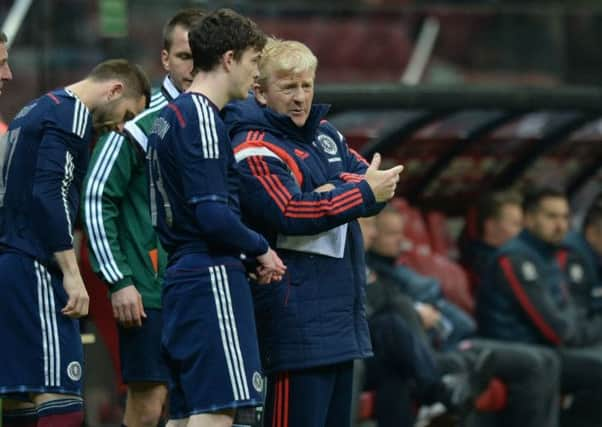Andrew Robertson biggest positive for Scotland


That accepted – and no-one does accept it more than the Scotland manager – there is a confluence of factors daring to suggest that Strachan is anointed in his present posting. Never mind that with the 1-0 success in Poland on Wednesday bringing his fifth win in ten matches, the current national manager is only one win shy of the total number of victories predecessor Craig Levein achieved in 24 games. Never mind that four straight clean sheets have made for the longest such run since a seven-game sequence between 1996 and 1997. Never mind that Scotland are on course to break into the top 25 in Fifa’s World Rankings. And never mind that, until this week, not since 2000 had Scotland won three away fixtures on the spin.
No, the sight of 19-year-old left-back Andrew Robertson looking entirely at home in the international domain during his 23 minute run-out gives reason to believe that the stars really might be aligning for Strachan. When the 57-year-old was appointed last January, one of the many holes to fill in a tea-bag of a failing team appeared to be left-back. At that time, Robertson wasn’t a contender for the job. He wasn’t even a professional footballer, with the youngster then on amateur terms at Queen’s Park. Yet, Strachan prefers not to dwell on the break-neck speed of Robertson’s rising status in the game but what has underpinned it.
Advertisement
Hide AdAdvertisement
Hide Ad“It was eight months’ hard graft for him to get there,” Strachan said. “I know other people take a bit longer but he’s had that hard graft at Queen’s Park. I always felt, from the first time I saw him, that he was a bit different. All he has to do now is keep going. If he relaxes, then the game bypasses you. It’s up to him to keep going. We’ve enjoyed having him in our company this week. He’s been good. When he first picked it up [after coming on], I thought ‘that’s good’. There are no grey areas there. We told him the night before at training: ‘Don’t think about what an international player does. You do what you’re good at. Get forward, crossing, take people on, get back’. So he did that when he got on.”
How bright Robertson’s future proves to be, meanwhile, “is up to him”, stressed Strachan. “The future’s in his hands, not mine, not yours, but his,” he added. The fact the United defender appears to have one at Scotland level means Strachan has the option of a natural left-back where 13 months ago it seemed one of the side’s make-do-and-match berths. “Yes, but we’ve got Charlie [Mulgrew] who played there,” the Scotland coach countered. “Terrific. [Steven] Whittaker playing there. So we’re getting stronger in the full-back positions.”
The greatest source of encouragement is that Scotland appear to be getting stronger in all positions. Allan McGregor and Steven Fletcher are no longer guaranteed starters at either end of the pitch. Not because they have gone off the boil in the English Premier League but because fellow travellers in that set-up, David Marshall and Steven Naismith, have enhanced their reputations at club level this season.
The concern over Scotland ahead of Euro 2016 is that right now they seem to be making bricks from straw. There is no question that Strachan has his players superbly well drilled. Equally obvious is that he has instilled in them a conviction - forever a central component in teams that are obdurate and difficult to beat. However, Poland and Norway were beaten in games where Scotland only had four shots on target in total. Both these opponents also missed glaring chances. These are not elements that form the blueprint for sustained success. As Strachan well knows.
“We have to do other things,” he said. “We have to work even harder at other things. But we can’t put any more hours in. That’s the hours that we get. We’re trying to do four things in a training session that lasts an hour, when you would maybe do one or two possibly, but we’re having to cram things in. But we’ll do that.”
Momentum and belief are major drivers in being competitive in the football environment and Strachan hopes that supporters are taking heart from a run that has brought four wins and a draw from five outings. “I think that’s why we have the national team – to make people happy,” he said. “They probably want a wee bit more, but we’ll try and do that. That’s all we can guarantee. We’ll use the hours we’ve been given, that’s for sure.”
Moreover, the Poland that Scotland will meet when they next take to the magnificent Warsaw national stadium in October will be a more threatening beast with Borussia Dortmund pair, Robert Lewandowski and Jakub Błaszczykowski both missing through injury the other night. This pair are among the most accomplished talents currently performing in European football. Strachan, though, wasn’t for biting when asked if the Dortmund pair would make the Poles a different proposition.
“I can’t tell you. I really can’t tell you,” he said. “That’s not being funny. I don’t know. I really don’t. You could probably say ‘how are we going to be with [James] Forrest, [Shaun] Maloney and [Robert] Snodgrass [who didn’t play this week]?’ I don’t know.”
Advertisement
Hide AdAdvertisement
Hide AdNo-one can know how effective Scotland will be when it comes to the “nitty gritty”, as Strachan has termed it. But it represents progress merely to be able to say that there is every chance Scotland won’t be as ineffective as they have proved at key junctures in recent qualifying campaigns.